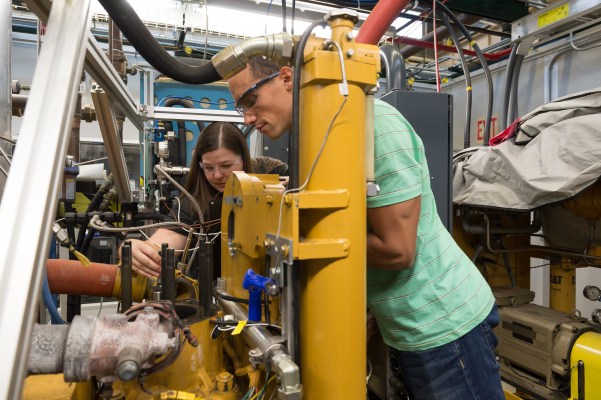
Diesel engines are the workhorses of freight transportation and agriculture — and by extension keep the economy fed and well supplied. They also have a dirty side.
The founders of ClearFlame Engine Technologies, a four-year-old startup based in Geneva, Illinois, say they have found a way to clean them up.
The company, which participated in TechCrunch Disrupt’s 2020 Startup Battlefield competition, has developed a novel way to get diesel style engines to operate on renewable fuels like ethanol. The technology essentially combines the performance benefits of the diesel engine design with the low costs and the low emissions associated with these alternative fuels, co-founder and CEO BJ Johnson said in a recent interview with TechCrunch.
By replacing 100% of the petroleum fuel with a decarbonized fuel like ethanol, ClearFlame says its technology reduces net greenhouse gas emissions by at least 40%, and reduces particulate matter and smog (NOx) to near zero levels.
ClearFlame isn’t redesigning the diesel engine. Instead, Johnson and co-founder and CTO Julie Blumreiter have developed a way to modify the internal components of the engine to alter its thermodynamics to be able to quickly ignite and combust decarbonized fuels. The company’s technology means 80% to 90% of the diesel engine parts remain unchanged, according to Johnson.
The upshot is a technology that provides a fast and low cost way to reduce emissions, Johnson told TechCrunch. It’s the kind of solution that companies might need as local, state and national governments tighten emissions regulations.
The technology can be retrofitted into existing older diesel engines or applied to new engines that have yet to be installed in trucks or used in other industrial applications. ClearFlame is aiming to work directly with the engine manufacturer, which will still give the company access to the secondary market because every OEM has its own aftermarket parts group, Johnson said.
“We want to leverage their supply chain, their ability to scale and reach these markets, and the trusted name that comes with them,” Johnson said, explaining the company’s reasoning for targeting OEMs.
The technology was first developed in a Stanford University lab, where Blumreiter and Johnson earned their Ph.D. degrees. At Stanford, they were focused mostly on ethanol and methanol, which are simple liquid alcohols. However, Johnson noted that further research has shown that the same concept works equally well on natural gas and ammonia.
“The big difference here is that you have to tweak the injection system if you want to move away from a regular ambient liquid fuel,” Johnson said. “There’s just a ton of business value in being able to run an engine efficiently and cleanly on a fuel that just sits in a glass at ambient conditions, which is what those alcohols do.”
ClearFlame has already made headway with its technology, including landing partnerships and raising capital. The company completed a proof-of-concept demonstration of their technology on a Caterpillar engine at Argonne National Laboratory. ClearFlame is also conducting a demonstration on a Cummins engine platform supported by funding from the Department of Energy.
In April, ClearFlame announced it raised $3 million in a round led by CleanEnergy Ventures. The company has also landed several million dollars in grant money, including Small Business Innovation Research awards from the National Science Foundation, DOE and U.S. Department of Agriculture.



